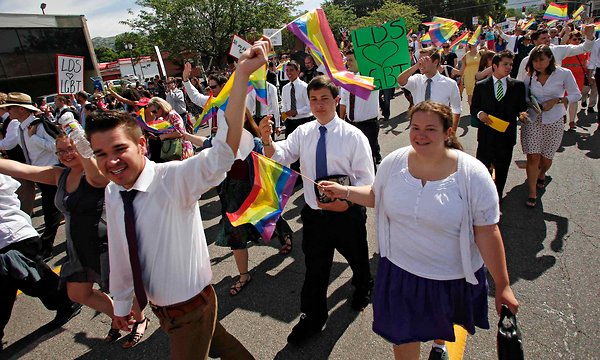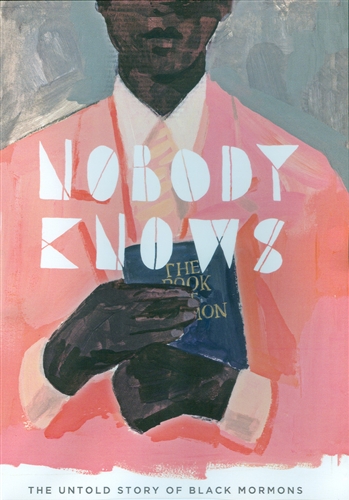34 Years to Find a Mormon Voice
By Amy Levin We hear about the black vote, we hear about the Mormon vote, but we seldom-to-never hear about the black Mormon vote (or black Mormons at all, for that matter).
By Amy Levin
We hear about the black vote, we hear about the Mormon vote, but we seldom-to-never hear about the black Mormon vote (or black Mormons at all, for that matter). In fact, when it comes to presidential politics, most of us can’t even read the word Mormon without Mitt Romney’s branded-white, male face suddenly appearing, side smirk and all. Despite the Mormon church’s efforts to diversify and “disrupt the dominant image of young white males riding bikes and knocking on doors” with examples like the “I’m a Mormon” campaign and the “Meet Mormons” website, this image of the white, heterosexual, Romney-voting Mormon tends to hover in our dim and narrow collective (voter) imagination.
Arguably, the non-heterosexual Mormon demographic has graced the media limelight in the past few weeks more than other Mormon minorities, helping to correct the Mormon stereotype. According to Jack Healy’s NYT article this week on the “Gentle Dissent in Mormon Church on Gay Marriage,” Obama’s recent endorsement of same-sex marriage and Romney’s run have both captured the nation’s attention, directing it to same-sex politics of the Mormon church. Many of us wait patiently (angrily?) to see if the church will repeat the outsized financial and organizational support it threw at Proposition 8 in 2008 in California in the four new states that will vote on same-sex marriage in the upcoming November election. But if the rise of outspoken advocates (or so-called dissenters) in the LDS church who call for more sensitivity and acceptance of homosexuality indicates anything beyond pride rallies and Pew forum confessions, we may see a more fundamental shift in Church policy. And one day (gasp!) doctrine.
Healy’s main point is that, while it may be gentle, there is indeed dissent within the Mormon church on its perceived strict opposition to homosexuality. But non-heterosexual Mormons aren’t the only church dissenters making big news. Both the New York Times and USA Today recently featured some of the untold narratives of black Mormons, a demographic that makes up 3% of the six million American Mormons (according to my trusted calculator that’s 180,000). Speaking of equations, it’s very telling that the coverage of black Mormons has been told through the lens of candidacy preferences. I’m getting the sense that this is what people are thinking: if African Americans = Barack Obama, and Mormons = Mitt Romney, then African American Mormons* = ?. No, it’s not Barack Romney. So who in this scenario are the dissenters? The African American Mormons who vote for Obama, or for Romney?
This question seems to be on the mind of Peggy Fletcher Stack, who wrote this week in USA Today. Stack says that “black Mormons look at Obama, the Democrat, and Romney, the Republican, and find themselves caught between political perspectives: Many still lean liberal, others have switched parties after joining the church, and some find themselves going back and forth.” Thankfully, Stack admits that voters don’t base their decisions solely on race or religion, but I believe she is right in her comment that “many weigh whether a candidate’s personal story, politics and perspective match their own.”
Both Stack and Susan Saulny, who wrote a piece in the NYT last month on Black Mormons and identity politics, interviewed a number of African American Mormons on their voting preferences, many of whom are voting for Obama “despite” things like Romney’s Mormonism, or Obama’s position on same-sex marriage. While the articles feature a diverse mix of black Mormon voters, I’m struck by sentences like this one taken from Stack’s article: “Bryndis Roberts joined the LDS church in 2008, but didn’t convert her politics. Roberts is a lifelong Democrat who has never voted for a Republican.” The fact that this woman did not “convert her politics” (fascinating use of convert) for her religion is, on the one hand, a telling statement about voter politics, but on the other hand, it glosses over the very complicated (recent) history of liberal Mormons. Mormon identity, like any religious identity, has never been monolithic, thus never solely white and conservative. So beyond the fact that there are indeed black, liberal Mormons, we aren’t gaining much information from these narratives besides the fact that there is a (weak) correlation between personal identity and presidential candidates.
Given the Mormon church’s history of barring of African Americans from its all-male priesthood (revoked in 1978) because “dark skin was considered a biblical curse,” the greater audibility of the black Mormon demographic is at least indicative of some progress. Conduct a general google search and you’ll find the black Mormon homepage, and even a link to the site for the DVD “Nobody Knows The Untold Story of Black Mormons.” Perhaps the shock value is beginning to wear off (do I write about liberal religious people too much?) but there seems like no better way to complicate the Mitt Romney white-as-Provo-snow face of Mormonism than to delve into the lives of the Mormon dissenters. They’re historically non-heterosexual, non-white, and heck, even gloriously campy.
*I’m shifting between “black” and “African American” to describe this demographic of Mormons due to my preference in using the latter versus those writers I quote who use the former.

